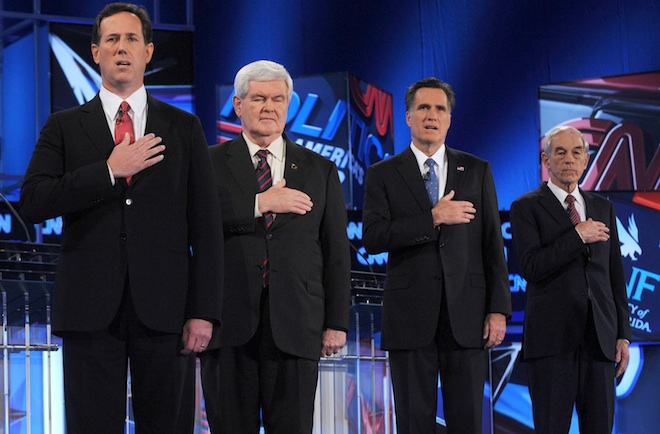It’s now clear that questions about former Massachusetts Gov. Mitt Romney’s inevitability as the GOP nominee are real. Not that there remain many plausible ways to see how he doesn’t ultimately get the nod — but Republicans are truly getting dragged into this thing kicking and screaming.
And in the end, even if the very conservative Tea Party faction of the party does (very grudgingly) accept him, it could dampen the party’s ability to get energized and organized when it comes November.
“There’s no doubt that turnout is low. That’s evidence of a lack of connection there,” said Dr. Lee Miringoff, director of the Marist Institute for Public Opinion at Marist College in an interview with TPM. “There’s an anti-Obama sentiment out there and a strong Tea Party sentiment. But they haven’t found a home. Romney has no provided that energy to the GOP.”
The question of turnout reflects a more general theme about the race. Iowa and New Hampshire saw increases in Republican turnout in the first caucus and primary — but they were slight. South Carolina has been the outlier so far — with an increase of nearly 150 thousand voters from 2008. But Florida saw a big drop off, turnout down around 275 thousand, and the numbers for Nevada were even worse — Silver State GOPer’s went from 70 thousand caucus attendees in 2012 to 44 thousand in 2012.
For some analysts there was a clear connection — in the states Romney did well, Republicans aren’t exactly pumped. But that could change when Romney, despite the recent bumps in the road to the nomination, finally wraps up the nomination, right?
“I think the lack of enthusiasm among Republicans is partially about Romney, but more broadly a reflection of their discontent with the field as a whole,” said Public Policy Polling (D) pollster Tom Jensen in an email to TPM. In addition to PPP, Pew numbers from early January found the same trend. “We did a national poll last week that found only 47% of GOP voters were satisfied with their choice of candidates, while 41% wished someone else would get into the race. That compares to 73% of Democrats who said they were happy to have Obama as their candidate.”
“Republican voters aren’t ready to run through a wall for any of these candidates, in contrast to the way Democrats felt about Clinton and Obama in 2008,” he went on. “That may change once they have a nominee and the focus shifts to beating Obama, but for now Democrats are more excited for the fall.”

Theoretically, it would be quite a challenge to dampen Republican spirits to the point that they could lose the edge on enthusiasm heading into November of 2012 — but the last few weeks suggest it could happen. The economy has ticked up bringing the President’s approval along with it, something Miringoff said is “More of a motivator if the approval rating is tanking — it’s not a great strategy if the worst is behind us.” The GOP primary process is getting more negative and disruptive, continuing on even though there’s a candidate with the most money and organization, not to mention the support of several well-funded super PACs. And Obama himself has made a successful pivot to jobs and the economy, coupling it with foreign policy successes that provide a supporting argument on his competency as President.
It is more likely that Republicans will rally around Romney or whomever is the candidate — the smart bet is the anti-Obama sentiment will be a major motivator after Americans suffered through a three year recession. But will that be enough to elect a bland or flawed GOP nominee? This is where Miringoff says the GOP may run in trouble when the height of the campaign comes in the fall.
“You do want to energize your base,” he said. “If in September and October there’s a lot of frustration with independents, who to turn off the campaign because they aren’t satisfied with the candidates, it may become a base election. Obama’ recent decisions certainly seem to show he understands that.”






